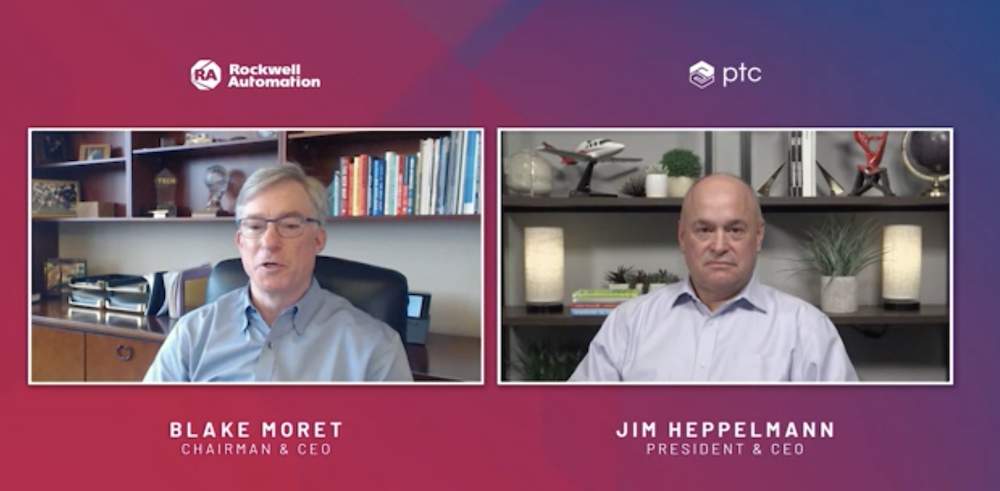
Automation Fair recap: Pandemic has led to increased digitization, collaboration
November 30, 2020
By
Kristina Urquhart
Experts at Rockwell Automation's annual conference say the COVID-19 crisis is accelerating digital transformation initiatives
 From left: Blake Moret, chairman and CEO of Rockwell Automation, and Jim Heppelmann, president and CEO of PTC
From left: Blake Moret, chairman and CEO of Rockwell Automation, and Jim Heppelmann, president and CEO of PTC The COVID-19 pandemic is signalling a new era of digital transformation that hinges on better supply chain strategies and increased collaboration, said thought leaders at a Rockwell Automation conference this month.
From Nov. 16 to 20, the company staged its 29th annual Automation Fair – which, for public safety reasons, was a largely virtual event renamed Automation Fair at Home.
Attendees were able to access a full slate of sessions with global thought leaders as well as exhibits showcasing Rockwell products and solutions in a virtual trade show experience. The conference recordings are available online until June 2021.
New thirst for digital
A key theme of the weeklong event was that the COVID-19 crisis has accelerated the move to digital for manufacturers.
With the entire value chain – from ideation and design to manufacturing and logistics – able to be digitized, manufacturers can reimagine their products and processes over and over in a virtual environment that doesn’t affect final production or delivery.
Uncertainty around the supply chain this year has been caused by a number of macroeconomic conditions, said Ernest Nicolas, senior vice-president of integrated supply chain at Rockwell Automation.
Constrained markets, foreign currency, spot pricing, global regulations and the pandemic have all squeezed the supply chain. The priorities for manufacturers now, said Nicolas, is implementation of supply chain strategies to improve delivery reliability, supply chain design and network optimization.
Risk mitigation, automated decisions, simplified experiences, customer loyalty/customer centricity, visibility, integrated decisions and total cost optimization are just some of the ways to achieve stronger supply chains, he said.
Simulation is a ‘superpower’
Ajei Gopal, chief executive officer of ANSYS, a Rockwell partner and specialist in engineering simulation, expects that digital transformation initiatives have been moved forward by at least 10 years.
“Manufacturers are no longer thinking about their products as purely physical things, but rather as digital representations of physical products,” Gopal said. “Manufacturers now regularly use physics-based analysis to inform their product decision-making. And engineering simulation delivers the purest digital representation of those products.”
“You can think of simulation almost as a superpower,” Gopal said. Not only does simulation provide the best design for a product, it can also specify the best material for that product.
“The result is a product that behaves exactly as intended, and that meets or even exceeds the consumer’s expectations,” he explained. “It enables you to launch more of the right product, and to do so at a faster pace.”
Simulation can also ensure rapid supply chain planning and forecasting, which became integral at the onset of the pandemic.
Digital transformation ‘imperative’
Another urgent issue for manufacturers in 2020 has been connecting remote workers. The need for secure network connections has galvanized digital transformation, said Mick Mancuso, director of connected enterprise operations for Rockwell Automation. “It is a business imperative now,” he said.
In a conversation with Jim Heppelmann, president and CEO of PTC, Rockwell Automation chairman and CEO Blake Moret identified augmented reality as a technology that has been well received by Rockwell’s customers as they adapt to remote work.
“Augmented reality, I always like to say, is like IoT for people,” Heppelmann said. “This idea of solving both for optimizing equipment and optimizing people is very special to our partnership.”
Heppelmann reflected on the importance of working with technology partners that bring different strengths to the table as the pair announced that the alliance between Rockwell Automation and PTC would continue into 2023.
PTC, a digital transformation vendor specializing in augmented reality, PLM, CAD and IIoT solutions, recently launched Factory Insights as a Service alongside Rockwell and Microsoft, offering a software-as-a-service solution for real-time production performance monitoring, asset utilization and digital work instructions.
Changes to partner program
One way manufacturers can find technology partners is through Rockwell’s Original Equipment Manufacturer (OEM) Partner Program. Over the course of the week, the company announced some updates to the program, which aims to connect almost 3,300 manufacturers around the world with partners to spur innovation.
“The right OEM is critical to the success of a manufacturing operation,” said Dan Throne, OEM manager for North America at Rockwell Automation.
“Customers need innovative machines that easily integrate into their operations. They require flexible and efficient equipment that increases business agility, optimizes productivity and can turn mined data into working information capital.”
A co-marketing platform now allows OEM customers to use information, industry case studies and successes with products.
Rockwell has also increased technical resources and supply chain alignment, in addition to discounts and rebates that enable OEM partners to create differentiation and overcome business challenges.
The enhanced OEM Partner Program is now open for enrollment in North America.
New product launches
During the fair, Rockwell Automation announced it has developed new products with CIP Security to help facilitate secure communications.
Developed by the global trade and standard development organization ODVA, CIP Security is the only standard designed to secure communications between industrial control systems and other devices on an EtherNet/IP network.
The new industrial control products offering CIP Security include Allen-Bradley PowerFlex 755T AC drives and Kinetix 5300 servo drives. They join several other Rockwell products that already support CIP Security, including ControlLogix 5580 controllers, Kinetix 5700 servo drives and the 1756-EN4TR communication module.
To help protect the many devices in use today that don’t support CIP Security, Rockwell also introduced the CIP Security Proxy device, which can be deployed in a physically secured location to provide CIP Security for industrial control devices.
Next steps for digital transformation
Mancuso’s session explored how the market pressures in 2020 have heightened demand for automation and increased the need for greater supply chain resiliency. As a result, more executives are getting involved in decision-making about technology, he said, which is leading to more productive conversations with clients about their plans for digital transformation.
Here’s what Mancuso recommended companies do as they begin to build their digitalization plans:
- Build a cross-functional team containing experts from both the IT and OT departments. This will help ensure the digital transformation plan works for everyone.
- Develop a plan or roadmap that defines what success looks like help to bring a mission or purpose to your company’s digital transformation. A change management plan will help get employees on board by explaining what’s changing and why.
- Ensure you have a secure OT environment – and that doesn’t mean relying on a single technology, Mancuso said. One kind of security technology is not sufficient against diverse threats targeting industrial operations, and cybersecurity must be specifically executed to the risks and requirements of specific OT environments.
Advertisement
- Festo researchers unveil robotic mobile assistant with gripping technology
- ATS Automation to host virtual solutions showcase this week
